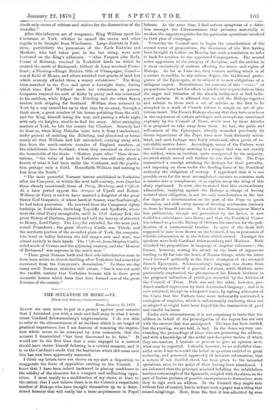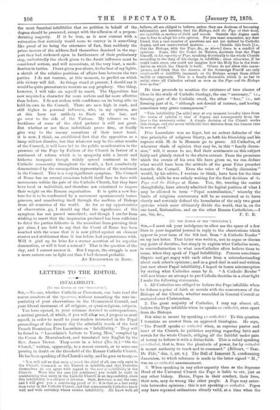Rome, Janurny 15, 1870. ALLOW me once more to put
in a protest against your surmise that I furnished you with a cock-and-bull story in what I wrote about Cardinal Schwarzenberg's tergiversations. I do not wish to refer to the circumstances of an incident which is no longer of practical importance, but I am desirous of removing the impres- sion which seems to be conveyed by your comments, that the account I transmitted "has been discovered to be false." It would not be the first time that a man engaged in a contest should have shown himself faltering in a critical moment, and it is to the Cardinal's credit that the hesitation which did come over him has now been apparently mastered.
I think my letters have not shown on my part a disposition to exaggerate the force of opposition existing in the Council. I know that I have been indeed backward in placing confidence in the solidity of the elements for a compact and unflinching oppo- sition. I must testify to a modification of my views, at least to the extent that I now believe there is in the Council a respectable number of Bishops who have brought themselves up to a deter- mined humour that will really bar a tame acquiescence in Papal
behests. At the same time, I find serious symptoms of a defec- tion amongst the Ultramontanes that promises materially to weaken the support requisite for the particular operations involved in their plan of campaign.
Yesterday the Council met to begin the consideration of the second series of propositions, the discussion of the first having been brought to a close on Monday last with a resolution to refer it back for revision to the appointed Congregation. The second series appertains to the category of discipline, and the articles in it treat exclusively of matters affecting the duties and rights of Bishops. As far as I can see, they contain nothing which is of a nature to modify, in any serious degree, the traditional prero- gative of the Episcopate, or to subject it to new obligations of a stringent import. Nevertheless, the contents of this "caller" of propositions have had for effect to kindle into a quite furious blaze the anger and irritation of the already indisposed or half-indis- posed prelates. It is affirmed that to call the Bishops together and submit to them such a set of articles as the first to be accepted in a work of Church reform is simply an act of gra- tuitous insult. The French Bishops also say that they have ever been in the enjoyment of certain privileges and exemptions, sanctioned expressly by the Council of Trent, which now by these Articles it is proposed to take away from them. In fact, the pride and self-esteem of the Episcopate, already wounded previously by divers injunctions of the Pope, have now been furiously stimu- lated, and such feelings once fairly awakened, often prove of in- calculable motive force. Accordingly, many of the Fathers went into Council yesterday morning in a temper that was not exactly the mildest, when an incident, quite unexpected by the majority, occurred which served still further to stir their bile. The Pope transmitted a rescript rebuking the Bishops for their garrulity, and imposing on them under the binding force of his Pontifical authority the obligation of secrecy. I apprehend that it is not possible even for the most accomplished casuists to construe such a missive into a compliment, or to explain away the sting of this sharp reprimand. It must also be stated that this extraordinary admonition, implying against the Bishops a charge of having violated their obligation, is not the only manifestation in the last few days of a determination on the part of the Pope to quash discussion, and stifle every means of uttering sentiments contrary to those he himself favours. It is a fact that Monseigneur Maret's last publication, though not proscribed by the Index, is now forbidden admittance into Rome, and that the Pontifical Censor has refused to give the Bishop of Orleans his sanction for the pub- lication of a controversial treatise. In spite of the fresh bolt supposed to have been drawn on the Council, I am in possession of reliable information as to the debate which ensued. Amongst the speakers were both Cardinal Schwarzenberg and Mathieu. Both attacked the propositions in language of singular vehemence ; the former, however, resting his attack on the basis of arguments tending to fly far into the heart of Roman things, while the latter stood forward spiritually as the direct champion of the wronged French Episcopate. Schwarzenberg's language was drawn from the repertory rather of a general reformer, while Mathieu more particularly emphasized the grievances of his French brethren in the proposed infraction of privileges accorded by the Articles of the Council of Trent. Both one and the other, however, pro- duced marked impression by their determined language ; and it is now admitted, though in whispered tones, by sighing advocates of the Curia that the Fathers have most untowardly contracted a contagion of suspicion, which is unfortunately rendering them not as adapted as might have been hoped for the transaction of good and careful business.
Under such circumstances, it is not surprising to learn that the address in behalf of the promulgation of the dogma has not met with the success that was anticipated. The hare has been started, but the running, we are told, is bad. In the dense mystery sur- rounding the proceedings of those who are promoting the address, and with a knowledge of the artful and deceptive tactics of which they are masters, I hesitate at present to give an opinion as to what may be expected. I should, however, be an unfaithful chro- nicler were I not to record the belief in quarters entitled to great authority, and possessed apparently of intimate information, that a serious if not decided check has been given to the intended operations, even to the point of their having been abandoned. I am informed that the principal mischief befalling the infallibilists has been smnescruple of the Spaniards, coupled with thealann on the part of Italian prelates of possible consequences to themselves, were they to sign such an address. In the Council they might vote without fear of control, but to indorse such a paper was a thing that caused misgivings. Now, from the first it was admitted by even
the most fanatical infallibilist that no petition in behalf of the dogma should be presented, except with the adhesion of a prepon- derating majority. If it be true, as is now current with a reiteration that certainly would seem to convey in it something like proof of its being the utterance of fact, that suddenly the prime movers of the address find themselves deceived in the sup- port they had reckoned upon in furtherance of their preliminary step, undoubtedly the check given to the Jesuit influence must be considered serious, and will necessitate, at the very least, a modi- fication in tactics. I have given you above, to the best of my lights, a sketch of the relative positions of affairs here between the two parties. I do not venture, at this moment, to predict on which side victory will fall. As things stand at present, I should say it would be quite premature to venture on any prophecy. One thing, however, I will take on myself to assert. The Opposition has now acquired a character far more serious and far more effective than before. I do not reckon with confidence on its being able to bold its own in the Council. There are men high in rank, and still higher in personal influence, who, in my opinion, are at this hour not unlikely to flinch at the last, and go over to the side of the Vatican. My reliance on the backbone of some of the chief prelates is still not great. But whether or not these individuals prove firm, or finally give way to the uneasy sensations of their inner heart, it is now, I think, an established fact that the opposition as a lump will not dissolve, but that whatever may be the other results of the Council, it will have led to the public manifestation in the presence of the Pope by Fathers of the Church in favour of a sentiment of reform which is in sympathy with a latent and hitherto inorganic though widely spread sentiment in the Catholic community throughout the world, a fact conclusively demonstrated by the cosmopolitan representation of the sentiment in the Council. This is a very significant symptom. The Council of Rome has on several occasions beheld itself face to face with movements within the pale of the Catholic Church, but they have been local or individual, and therefore not calculated to impose their weight on the Roman organization. It is quite a new fea- ture for it to be confronted by a movement spontaneously homo- geneous, and manifesting itself through the medium of Bishops from all countries of the world. As far as my opportunities of observation go, I should say that the significance of this symptom has not passed unnoticed ; and though I am far from wishing to assert that the impression produced has been sufficient to deter the parties hitherto in the ascendant from pursuing their pet aims, I am bold to say that the Court of Rome has been touched with the sense that it is now pitted against an element stouter and stubborner than it has before had acquaintance with. Will it gird up its loins for a sterner assertion of its superior domination, or will it beat a retreat? That is the question of the day, and I cannot answer it. But I repeat, the struggle is now a more serious one to fight out than I had deemed probable.
AN ENGLISHMAN IN ROME.



































 Previous page
Previous page